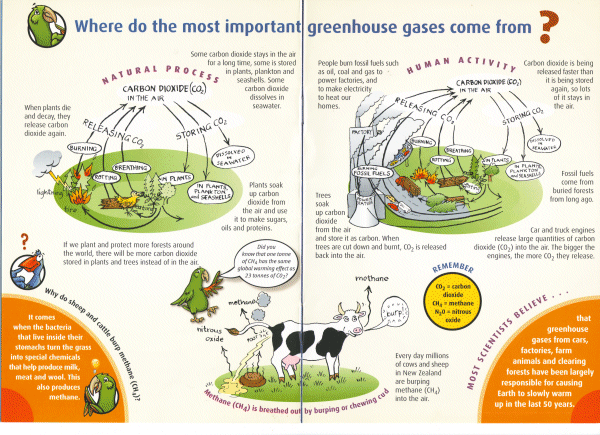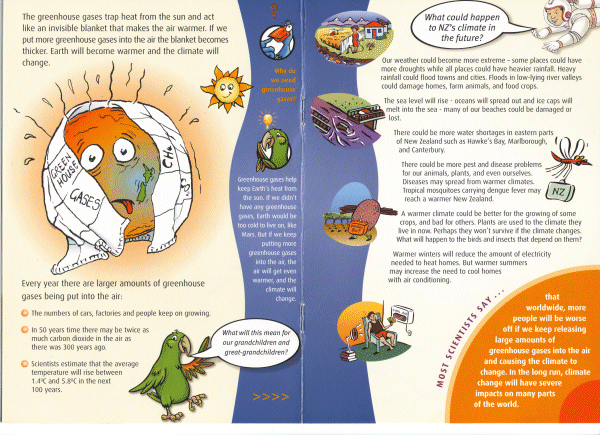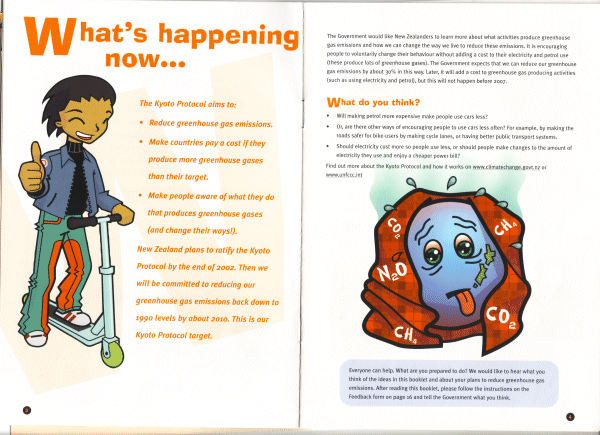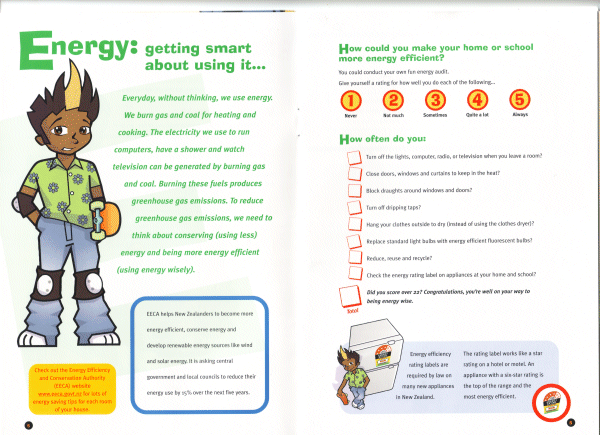| David
Parker Presentation
NZ Ministry for the Environment publications |
|||||
|
Return to presentation to NZ Minister of Energy & Climate Issues
|
This page contains examples of the
education resources delivered into our schools by the NZ
Climate Change Office*. *Note:
This office was expanded by the new Labour administration in 2000 so
that its activities transcended 11 Government departments. This
was to show the importance the Government placed on climate issues and
the maintenance of our 100% Clean Green Image. It was subsumed into the
Ministry for the Environment in 2003 though the Government finds it
"convenient" to pretend the Office still exists. Principle of energy: “When a symbol use works to deny change it will materially alter the
potential of the universe (energy) in a way that results in a reduction
in the capacity of the symbol user to mirror reality. When a symbol use
works for the acceptance of change it will increase the capacity of the
symbol user to mirror reality.” Denials of change: (1) The booklets suggest climate
change is bad. It confuses the normal changing state of the universe
with particular forms of change - in this case Human-induced Thermal
Build-up of Earth's surface. (2) The booklets evoke images of
atmospheric processes as a greenhouse. The troposphere or mixing zone is
characterised by a high capacity to transfer thermal energy by
convection. Greenhouses are characterised by suppressed transfer of
thermal energy by convection. (3)The booklets deny the central
issue which is that our carbon emissions increase thermal transfer by
convection i.e. there are increased levels of change with greater risk
of hurricanes, droughts and floods. (4) The booklets obscure the role
of water vapour in our experience of weather. They deny change in that
water vapour is the dominant Warmer Trace Gas with a relative fast cycle
(less than 14 days). Thus it is a critical agent of change. (5) The booklets states that
we can conserve energy which it defines as "using less
energy". This is a double denial of the transformation or change
properties that underpin the Principle of the Conservation of Change. The
booklets were titled Climate Change Earth
is very slowly getting warmer. Why
is this happening? Does What
can we do about it?
Examples
shown the Minister come from two booklets designed for Level 4 i.e.
11-12 year old students. As such they have optimal potential for
reaching a wide range of the public. The contents are easy to read,
framed with colourful illustrations and research shows that this level
of communication is effective with many adults. This is because adults
often lead busy, pressured lives and know that the information in such
publications is designed for quick, easy digestion and will not place
great demands on their time. The
pamphlets form the most authoritative introduction to the issue of
the impact of human activity on atmosphere balances for many primary
teachers. The coverage of the issue in the general media is confused and
patently ignorant. These pamphlets represent Government authority on the
subject.
The booklets were published against a general background in which the
Government was mainly concerned with protecting As
a result of this policy, investments in motorways, SUVs, Bulk-generated
electricity from coal and Gas plants, larger and inefficient dwellings,
air travel, dairy farming etc have caused an increase in carbon dioxide
emissions of 39% since 1990. At the same time investment in rail,
public transport, forests, dwelling based generation etc. has been
relatively minimal.
Late in 2005 it was revealed that Comment
to Minister of Energy/Climate Change Issues: The
publication is based on the use of the greenhouse symbol of the
atmosphere. The pamphlet says that so called scientists use the symbol.
However there is no scientific evidence that supports this use. In fact
the small amount of research done on this use of the greenhouse symbol
indicates it does not work in conveying climate issues. No
mention is made of the fact that the issue revolves around our impact on
the balances of trace gases. 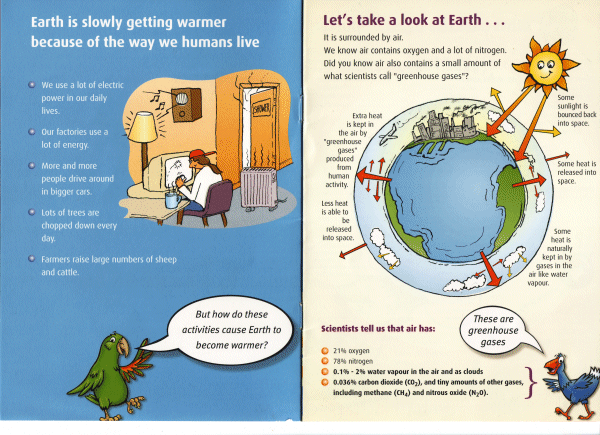
The air
constituency statement
by what the booklets calls " scientists" is nonsense. It omits the “miracle gas” Argon (0.9% of the atmosphere and a child of ten can to the sums to show the figures stack up to 102% if that is included.
There is not mention of water vapour in the list of " the most important greenhouse gases" in the above pages. Nor is it mentioned in the two pages that follow.
The above cartoon denies change on
a number of levels: It is not our planet that gets sick
if we destroy the thermal balances that sustain us. Rather it is our
mortality. Blankets, like greenhouses work by
reducing thermal convection. The atmosphere works by increasing thermal
convection i.e. increasing the rate of change as its level of thermal
energy increases
The page states that to reduce what it calls "greenhouse gas emissions we need to think about conserving (using less) energy and being more energy efficient (using energy wisely.)" This is confused and impossible. The confusion stems from the denial of the Principles of Energy. The wise use of energy or energy efficiency is about the careful use of resources (energy forms, not about the amount of energy we use. The critical issue is that environmental balances are sustained by our use.
Return to presentation to NZ Minister of Energy & Climate Issues |
|
|||
